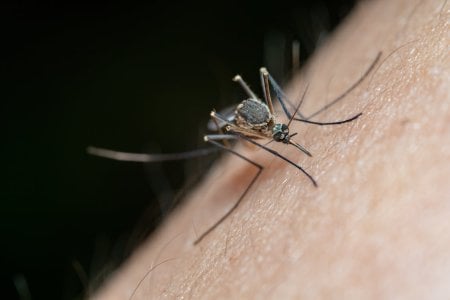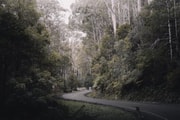Major health warning: Flesh-eating ulcer outbreak hits record high
In an alarming development for public health, authorities have issued a stern warning as a state grapples with an unprecedented outbreak of the flesh-eating Buruli ulcer.
Last year, a record-breaking 363 cases were diagnosed in the area, signalling a growing concern for residents, particularly in coastal regions.
The Buruli ulcer, a debilitating condition caused by Mycobacterium ulcerans, leads to extensive skin damage, characterised by painful lumps, swelling of limbs, and, in some instances, severe pain.
While most of the 2023 cases were not severe, the potential for significant health impacts cannot be understated.
The outbreak in Victoria has prompted the local Department of Health to emphasise the importance of early detection.
The bacteria responsible for the condition can be effectively treated with oral antibiotics, but the key is to catch it early. As the ulcers expand over time, delayed diagnosis can lead to more complex medical interventions and a more extended recovery period.
Ingrid Stitt, the state’s Acting Health Minister, has urged locals and visitors to coastal areas to exercise caution.
With the warmer weather providing a perfect breeding ground for mosquitoes, which are linked to the transmission of the disease, preventative measures are crucial.
‘Victorians should use an insect repellent with DEET, cover up when outdoors, and practice good hygiene by washing new scratches and cuts,’ Ms Stitt advised.
The Royal Children's Hospital stated that DEET, also known as diethyltoluamide, is a widely used ingredient that effectively repels mosquitoes, biting flies, fleas and ticks.
Generally, insect repellents containing up to 10 per cent DEET are effective in preventing mosquito bites in most situations.
To further reduce the risk of infection, the health department recommends mosquito-proofing homes with insect screens and avoiding areas and times when mosquitoes are most active, such as dusk and dawn.
The initial symptom of a Buruli ulcer infection is often a painless lump on the skin, which can easily be mistaken for a simple insect bite.
However, if left unchecked, the infection can penetrate the subcutaneous layer of fat and spread, eventually erupting as an ulcer.
Historically rare in Australia, the ulcer is now present in multiple regions, including north Queensland, the Northern Territory, and Victoria.
Over the past decade, the spread of the disease beyond its traditional confines has raised alarm among infectious disease specialists.
Areas such as Rye, Sorrento, Blairgowrie, and Tootgarook on the Mornington Peninsula are identified as high-risk zones.
Meanwhile, Frankston, Seaford, and several towns on the Bellarine Peninsula are considered to be at medium risk.
The disease has been reported in the suburbs of Geelong and inner Melbourne, indicating that it is no longer confined to coastal regions.
Professor Tim Stinear, a leading expert from the Doherty Applied Microbial Genomics Centre, has pointed to growing evidence that mosquitoes and possums are vectors in the transmission of the infection in Victoria.
‘Possums seem susceptible to getting this infection, but they also shed the bacteria in faecal material in quite high numbers. So that bacteria can be present in possum droppings, and this fits into the mosquito-breeding sites,’ he explained.
The Buruli ulcer is diagnosed through a PCR test, and treatment requires a specific combination of antibiotics.
Professor Stinear said: ‘You need the right combination of antibiotics. So get the right diagnosis and get on the right treatment.’
The infection's long incubation period, approximately four to five months, complicates matters, as it can be challenging to pinpoint where exposure occurred, especially when symptoms manifest in cooler months.
The fluctuation in the number of cases in Victoria is notable, with a steady increase observed since 2017.
The health department's records show an annual range of 200 to 340 cases, underscoring the need for heightened awareness and proactive measures.
A woman from Victoria shared her experience with the disease in this article.
You can watch 7News Australia’s coverage of the story here:
Source: 7News Australia/Youtube
 For our Senior Discount Club members, particularly those residing in or visiting the affected areas, it is imperative to stay informed and vigilant.
For our Senior Discount Club members, particularly those residing in or visiting the affected areas, it is imperative to stay informed and vigilant.
Protecting oneself from mosquito bites and seeking medical attention for suspicious skin lesions can prevent the spread and severity of this concerning disease.
Remember, your health and safety are paramount, and taking these precautions can help ensure you enjoy Australia's beautiful coastal regions without undue risk.
What are your thoughts on this health warning, members? Share them in the comments below!
Last year, a record-breaking 363 cases were diagnosed in the area, signalling a growing concern for residents, particularly in coastal regions.
The Buruli ulcer, a debilitating condition caused by Mycobacterium ulcerans, leads to extensive skin damage, characterised by painful lumps, swelling of limbs, and, in some instances, severe pain.
While most of the 2023 cases were not severe, the potential for significant health impacts cannot be understated.
The outbreak in Victoria has prompted the local Department of Health to emphasise the importance of early detection.
The bacteria responsible for the condition can be effectively treated with oral antibiotics, but the key is to catch it early. As the ulcers expand over time, delayed diagnosis can lead to more complex medical interventions and a more extended recovery period.
Ingrid Stitt, the state’s Acting Health Minister, has urged locals and visitors to coastal areas to exercise caution.
With the warmer weather providing a perfect breeding ground for mosquitoes, which are linked to the transmission of the disease, preventative measures are crucial.
‘Victorians should use an insect repellent with DEET, cover up when outdoors, and practice good hygiene by washing new scratches and cuts,’ Ms Stitt advised.
The Royal Children's Hospital stated that DEET, also known as diethyltoluamide, is a widely used ingredient that effectively repels mosquitoes, biting flies, fleas and ticks.
Generally, insect repellents containing up to 10 per cent DEET are effective in preventing mosquito bites in most situations.
To further reduce the risk of infection, the health department recommends mosquito-proofing homes with insect screens and avoiding areas and times when mosquitoes are most active, such as dusk and dawn.
The initial symptom of a Buruli ulcer infection is often a painless lump on the skin, which can easily be mistaken for a simple insect bite.
However, if left unchecked, the infection can penetrate the subcutaneous layer of fat and spread, eventually erupting as an ulcer.
Historically rare in Australia, the ulcer is now present in multiple regions, including north Queensland, the Northern Territory, and Victoria.
Over the past decade, the spread of the disease beyond its traditional confines has raised alarm among infectious disease specialists.
Areas such as Rye, Sorrento, Blairgowrie, and Tootgarook on the Mornington Peninsula are identified as high-risk zones.
Meanwhile, Frankston, Seaford, and several towns on the Bellarine Peninsula are considered to be at medium risk.
The disease has been reported in the suburbs of Geelong and inner Melbourne, indicating that it is no longer confined to coastal regions.
Professor Tim Stinear, a leading expert from the Doherty Applied Microbial Genomics Centre, has pointed to growing evidence that mosquitoes and possums are vectors in the transmission of the infection in Victoria.
‘Possums seem susceptible to getting this infection, but they also shed the bacteria in faecal material in quite high numbers. So that bacteria can be present in possum droppings, and this fits into the mosquito-breeding sites,’ he explained.
The Buruli ulcer is diagnosed through a PCR test, and treatment requires a specific combination of antibiotics.
Professor Stinear said: ‘You need the right combination of antibiotics. So get the right diagnosis and get on the right treatment.’
The infection's long incubation period, approximately four to five months, complicates matters, as it can be challenging to pinpoint where exposure occurred, especially when symptoms manifest in cooler months.
The fluctuation in the number of cases in Victoria is notable, with a steady increase observed since 2017.
The health department's records show an annual range of 200 to 340 cases, underscoring the need for heightened awareness and proactive measures.
A woman from Victoria shared her experience with the disease in this article.
You can watch 7News Australia’s coverage of the story here:
Source: 7News Australia/Youtube
Key Takeaways
- Victorian health authorities recorded a record number of Buruli ulcer cases in 2023, with 363 diagnosed Victorians.
- The Department of Health urged early diagnosis and treatment of the mosquito-linked skin condition, emphasising the use of oral antibiotics.
- Acting Health Minister Ingrid Stitt warns Victorians to take precautions against mosquito bites, especially in coastal regions and warmer weather.
- Research suggested mosquitoes and possums play a role in transmitting the infection in Victoria, with cases spreading beyond traditional coastal hotspots.
Protecting oneself from mosquito bites and seeking medical attention for suspicious skin lesions can prevent the spread and severity of this concerning disease.
Remember, your health and safety are paramount, and taking these precautions can help ensure you enjoy Australia's beautiful coastal regions without undue risk.
What are your thoughts on this health warning, members? Share them in the comments below!








